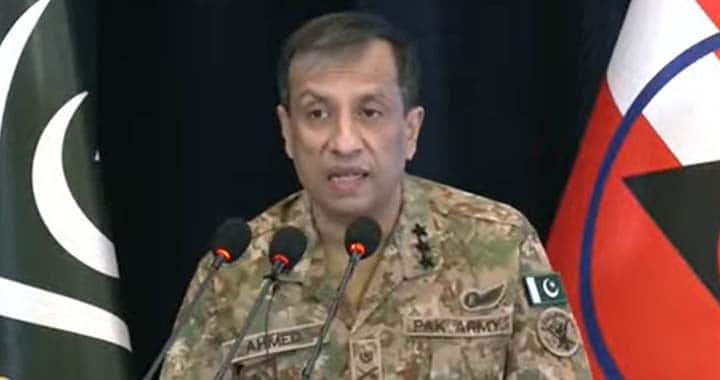Director General Inter-Services Public Relations (DG ISPR) Lieutenant General Ahmed Sharif Chaudhry said on Friday that, regrettably, terrorists and their facilitators were deliberately given space in Khyber Pakhtunkhwa under a calculated plan, while governance and public welfare were intentionally weakened a burden that the brave and resilient people of the province continue to bear with their blood.
Addressing a key press conference at the Corps Headquarters Peshawar, the military spokesperson said the purpose of the briefing was to review the province’s security situation. He began his address by paying tribute to the courageous people of Khyber Pakhtunkhwa for their immense sacrifices in the fight against terrorism.
“We, along with the proud people of Khyber Pakhtunkhwa, are determined to root out the menace of terrorism once and for all,” the DG ISPR said, reaffirming the Pakistan Army’s unflinching resolve to eliminate terrorism in all its forms and manifestations.
Presenting an overview of counterterrorism operations, Lt Gen Ahmed Sharif said that since 2024, a total of 14,535 intelligence-based operations (IBOs) had been conducted across Khyber Pakhtunkhwa averaging 40 operations daily. During these operations, 769 terrorists were neutralised, while 577 lives were lost, including 272 soldiers of the Pakistan Army, 140 police personnel, and 165 civilians.
He said that between January and mid-September 2025, security forces had carried out 10,115 IBOs in the province again averaging 40 operations daily in which 917 terrorists were killed. During these operations, 516 individuals embraced martyrdom, comprising 311 Pakistan Army personnel, 73 police officials, and 132 civilians.
Lt Gen Ahmed Sharif noted that the number of foreign militants killed in the last two years was the highest in a decade. “The number of foreign terrorists eliminated last year alone exceeded the total number killed during the previous nine years combined,” he said.
Recalling the national resolve forged after the 2016 Army Public School (APS) tragedy, the DG ISPR said that Pakistan’s intelligence agencies and law enforcement institutions had nearly realised the dream of a peaceful Khyber Pakhtunkhwa. “However,” he said, “unfortunately, under a deliberate plan, terrorists and their facilitators were given space. Governance and public welfare were deliberately undermined, and the people of this province are still paying the price for those decisions with their sacrifices.”
The military spokesperson said it was vital to understand the underlying causes behind the persistence of terrorism, identifying five key reasons:
1. Non-implementation of the National Action Plan (NAP).
2. Politicisation of the issue of terrorism and divisive national discourse.
3. India’s use of Afghanistan as a base camp for terrorism against Pakistan.
4. Availability of modern weapons and sanctuaries for terrorists in Afghanistan
5. The nexus between terrorists, criminal elements, and their local and political facilitators.
He revealed that in 2024 and 2025 alone, 161 Afghan terrorists were killed inside Pakistan, while 135 foreign militants were neutralised attempting infiltration from across the Afghan border. Additionally, 30 suicide bombers involved in attacks during this period were Afghan nationals. “These statistics expose how Afghanistan has become a base for terrorist operations under Indian influence,” the DG ISPR stated.
He added that the alliance between terrorists and criminal networks continues to enjoy local and political backing.
Lt Gen Ahmed Sharif further said that after the 2014 APS tragedy, all political parties, as well as federal and provincial governments, had gathered in Peshawar to formulate a unanimous framework, which became the National Action Plan (NAP). “All political parties agreed that to completely eradicate terrorism, the points under NAP must be implemented,” he said.
He explained that in 2021, the then-provincial government revised the plan, dropping earlier points and formulating a 14-point revised NAP, agreed upon by all political leaders, parties, and governments of the time. “The present government has adopted the same framework under the vision of Azm-e-Istehkam,” he said, adding that the foremost reason terrorism persists is the lack of implementation of NAP’s key points.
“The first point of the National Action Plan is to eliminate terrorists — and this is the only one related to ground operations,” he said. “Isn’t it true that our security forces are conducting over 40 intelligence-based operations daily in Khyber Pakhtunkhwa? Haven’t we neutralised over 900 terrorists this year alone? Aren’t our martyrs the living proof that this first point is being implemented with full resolve?”
He said the remaining 13 points also needed to be evaluated. “The second point was that the media, social media, and politicians would stand united against terrorism. This was agreed upon by all political parties in 2014. Are we still standing firm on that commitment?” he asked.
Lt Gen Ahmed Sharif questioned whether the voices calling for negotiations with terrorists were in line with the National Action Plan. “Is every problem solved through dialogue?” he asked. “When India fired missiles on Pakistan on May 6 and 7, targeting innocent children, women, seminaries, and mosques, did anyone call for talks the next day? Then why should terrorism be treated any differently?”
Reaffirming the Pakistan Army’s determination, the DG ISPR concluded that the security forces, together with the people of Khyber Pakhtunkhwa, will continue their mission until peace is fully restored across the country.
“Pakistan is fighting terrorists on the frontlines, but the roots of this war run deep into the politics of Kabul and the rivalries of global powers,” he remarked.





